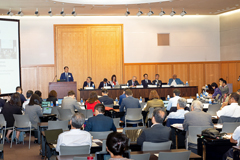Researchers from Japan, China, South Korea, and Russia Gather to Discuss Multilateral Cooperation at the North-East Asia Development Cooperation Forum 2019
2019.10.08
On Sept. 27 and 28, 2019, the North-East Asia Development Cooperation Forum 2019 was held at the JICA Research Institute (JICA-RI). The purpose of the Forum was for Japan, China, South Korea, Russia and other Northeast Asian countries to discuss future issues related to development aid and the possibility of cooperation, while sharing the knowledge they have gained through experiences as both the donor and recipient of development aid.

Participants discussed the role of multilateral cooperation of North East Asian countries and more
Since 2014, United Nations Economic and Social Commission for Asia and the Pacific (UNESCAP) East and North-East Asia Office has taken the lead in hosting the event. The theme of this sixth Forum was "Reinventing Multilateral Cooperation and roles of Northeast Asian countries to achieve SDGs." For the first ten years of the 2000s, multilateral cooperation garnered broad support from Organisation for Economic Co-operation and Development (OECD) Development Assistance Committee (DAC) donors and others, but during the decade from 2010 to 2019, unilateralism and nationalism gained momentum around the world. Now, United Nations agencies and multilateral development banks are facing a significant challenge. Meanwhile, Northeast Asian countries have arranged frameworks such as the Asian Development Bank (ADB) and the Asian Infrastructure Investment Bank (AIIB). In light of this, participants in the Forum discussed how to contribute to achievement of the Sustainable Development Goals (SDGs) in the future, while tracing the history of the individual approaches of Japan, China, South Korea and Russia on multilateral cooperation.
On Sept. 27, the Forum was opened with remarks from Ganbold Baasanjav, head of the UNESCAP East & North East Asia Office, Izumi Ohno, director of JICA-RI, Tatsufumi Yamagata, president of the Japan Society for International Development (JASID), and Masahiro Takasugi, deputy director-general of the International Cooperation Bureau, Ministry of Foreign Affairs.
In the first session, "Reinventing the role of multilateral cooperation of North East Asian countries," Tomoyuki Kimura, director general of the Strategy, Policy and Partnerships Department, ADB, Debapriya Bhattacharya, distinguished fellow at the Centre for Policy Dialogue, Bangladesh, Naohiro Kitano, professor at Waseda University and visiting fellow at JICA-RI, Yasuo Fujita, deputy director of JICA-RI, Xiaoyun Li, distinguished professor at China Agricultural University, and Huck-ju Kwon, professor at Seoul National University, took the stand, with Baasanjav serving as moderator.
During the Q&A session, those in attendance asked questions such as "Studies have shown that investment from the private sector is not contributing to public good, the area of climate change in particular. How can we regulate it?" and a lively discussion was held.
Kitano also participated in that day's second session, "Roles of Northeast Asian countries to facilitate multilateral cooperation: China's approach." During that session, the history and characteristics of China's multilateral cooperation were discussed. The third session addressed South Korea's approach to multilateral cooperation, and the fourth session, held the next day (Sept. 28), addressed that of Russia. JICA-RI Visiting Fellow Jin Sato (professor, University of Tokyo) took the stand at the fifth session "Roles of Northeast Asian countries to facilitate multilateral cooperation: Japan's approach" and presented Japan's experience of multilateral cooperation. In the sixth and final session, participants shared their thoughts on the role of Northeast Asian countries, as well as the outlook for the future.

事業事前評価表(地球規模課題対応国際科学技術協力(SATREPS)).国際協力機構 地球環境部 . 防災第一チーム. 1.案件名.国 名: フィリピン共和国.

事業事前評価表(地球規模課題対応国際科学技術協力(SATREPS)).国際協力機構 地球環境部 . 防災第一チーム. 1.案件名.国 名: フィリピン共和国.

事業事前評価表(地球規模課題対応国際科学技術協力(SATREPS)).国際協力機構 地球環境部 . 防災第一チーム. 1.案件名.国 名: フィリピン共和国.

事業事前評価表(地球規模課題対応国際科学技術協力(SATREPS)).国際協力機構 地球環境部 . 防災第一チーム. 1.案件名.国 名: フィリピン共和国.

事業事前評価表(地球規模課題対応国際科学技術協力(SATREPS)).国際協力機構 地球環境部 . 防災第一チーム. 1.案件名.国 名: フィリピン共和国.
scroll